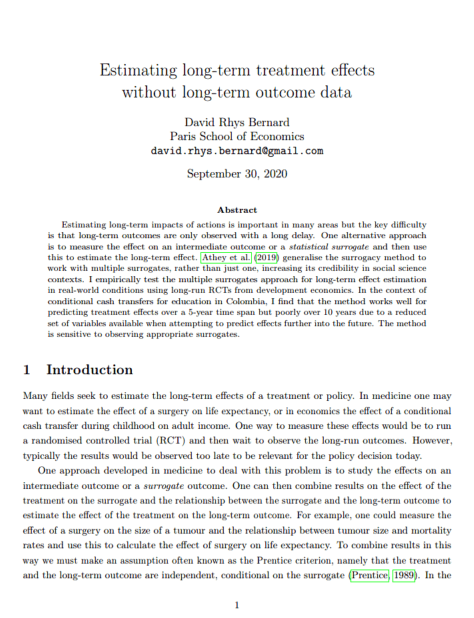Estimating long-term treatment effects without long-term outcome data
David Rhys Bernard (Paris School of Economics)
GPI Working Paper No. 11-2020
This paper has been awarded the paper prize of the 2019 Early Career Conference Programme.
Estimating long-term impacts of actions is important in many areas but the key difficulty is that long-term outcomes are only observed with a long delay. One alternative approach is to measure the effect on an intermediate outcome or a statistical surrogate and then use this to estimate the long-term effect. Athey et al. (2019) generalise the surrogacy method to work with multiple surrogates, rather than just one, increasing its credibility in social science contexts. I empirically test the multiple surrogates approach for long-term effect estimation in real-world conditions using long-run RCTs from development economics. In the context of conditional cash transfers for education in Colombia, I find that the method works well for predicting treatment effects over a 5-year time span but poorly over 10 years due to a reduced set of variables available when attempting to predict effects further into the future. The method is sensitive to observing appropriate surrogates.
Other working papers
Are we living at the hinge of history? – William MacAskill (Global Priorities Institute, Oxford University)
In the final pages of On What Matters, Volume II, Derek Parfit comments: ‘We live during the hinge of history… If we act wisely in the next few centuries, humanity will survive its most dangerous and decisive period… What now matters most is that we avoid ending human history.’ This passage echoes Parfit’s comment, in Reasons and Persons, that ‘the next few centuries will be the most important in human history’. …
Funding public projects: A case for the Nash product rule – Florian Brandl (Stanford University), Felix Brandt (Technische Universität München), Dominik Peters (University of Oxford), Christian Stricker (Technische Universität München) and Warut Suksompong (National University of Singapore)
We study a mechanism design problem where a community of agents wishes to fund public projects via voluntary monetary contributions by the community members. This serves as a model for public expenditure without an exogenously available budget, such as participatory budgeting or voluntary tax programs, as well as donor coordination when interpreting charities as public projects and donations as contributions. Our aim is to identify a mutually beneficial distribution of the individual contributions. …
It Only Takes One: The Psychology of Unilateral Decisions – Joshua Lewis (New York University) et al.
Sometimes, one decision can guarantee that a risky event will happen. For instance, it only took one team of researchers to synthesize and publish the horsepox genome, thus imposing its publication even though other researchers might have refrained for biosecurity reasons. We examine cases where everybody who can impose a given event has the same goal but different information about whether the event furthers that goal. …

